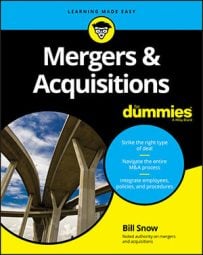As with many industries, the mergers and acquisitions business is full of errant opinions. People who have never done a deal before can’t possibly know what to expect, and as a result, many people harbor false impressions and incorrect assumptions about M&A. Here are ten of those common errors.
Don’t assume the deal is done after the LOI stage
The letter of intent (LOI) is a key document because it defines the basics of the deal and essentially becomes the foundation of the purchase agreement. Sellers and Buyers alike often make the mistake of thinking a signed LOI means all the work is done.
The LOI isn’t the final deal. In fact, the LOI simply ushers in a host of work called due diligence and contract writing. The heavy lifting of M&A doesn’t begin until after the LOI is signed.
Prepare for due diligence
Perhaps the number one mistake Sellers make is being unready for the crush of materials they have to provide for due diligence. A Buyer rightfully expects to gain access to the due diligence materials the moment the LOI is signed. Sellers, perhaps thinking the deal is done after the LOI is signed, often don’t share that same sense of urgency.
Sellers, plan ahead. You should start compiling the due diligence materials the moment you start marketing the company. This way, the moment the LOI is signed, you can provide the Buyer access to the due diligence materials. Check out the appendix for a detailed list of possible due diligence requirements.
Have a strong rationale for a high valuation
Many first-time deal-makers make the mistake of thinking, “If I ask for a crazy price, I’ll get it.” This notion is often compounded by the Seller’s own biased, sentimental opinion of his company’s worth. Although you may have a compelling valuation, you will have to provide the Buyer with the rationale for that valuation and have the data to back it up.
Buyers have to leap over financial hurdles in order to do deals. They don’t have unlimited piles of cash and aren’t looking to overspend when making acquisitions. Sellers need to provide Buyers with a rationale for a high valuation.
Never underestimate the other side’s sophistication
This miscalculation pops up with surprising regularity, typically with Buyers (and specifically, Buyers from large cities). Underestimating the other side’s sophistication and abilities is almost always a recipe for problems. Never take for granted your superiority over the other side; you’re bound to be unpleasantly surprised.
Be especially wary of those who purposely portray themselves as backwoods rubes. Odds are, they’re simply playing you and lulling you into a false sense of superiority.
Understand who really has the power
During an M&A process, power oscillates between Buyer and Seller. A huge error by novice deal-makers is to miscalculate their power. Failing to understand the amount of power you have simply increases the odds you’ll misread the situation and make a wrong move.
Misplaying a strong hand is bad, but misplaying a weak hand is worse. If you’re in a weak position with no other options, you may have to take the deal being offered. In that case, you’re not in a position to dictate terms.

